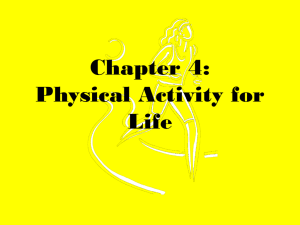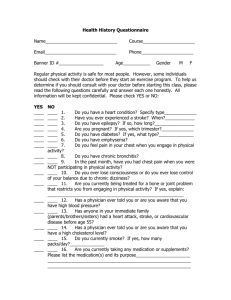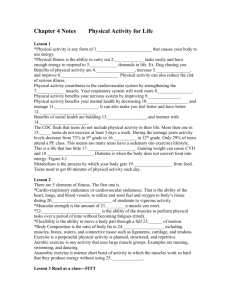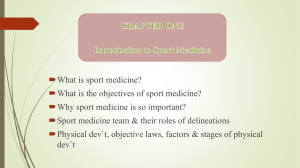Year 10 PE
advertisement
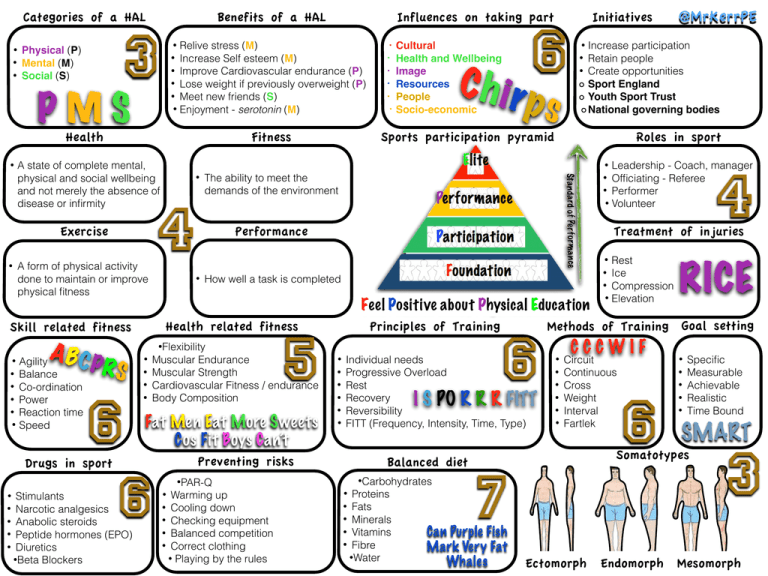
Categories of a HAL 3 ! • • • Benefits of a HAL Physical (P) Mental (M) Social (S) Relive stress (M) • Increase Self esteem (M) • Improve Cardiovascular endurance (P) • Lose weight if previously overweight (P) • Meet new friends (S) • Enjoyment - serotonin (M) • PMS Health • A state of complete mental, physical and social wellbeing and not merely the absence of disease or infirmity A form of physical activity done to maintain or improve physical fitness ! A B CPR • Agility • Balance S • • • • Co-ordination Power Reaction time Speed 6 Drugs in sport ! • • • • • • 6 C h i rp • • s Increase participation Retain people Create opportunities Sport England! Youth Sport Trust! National governing bodies Roles in sport 4 The ability to meet the demands of the environment Performance Treatment of injuries 4 • How well a task is completed Feel Positive about Physical Education 5 Muscular Endurance Muscular Strength Cardiovascular Fitness / endurance Body Composition Principles of Training ! • • • • • • I S PO R R R FITT Balanced diet •Carbohydrates •PAR-Q Warming up • Cooling down • Checking equipment • Balanced competition • Correct clothing • Playing by the rules 6 Individual needs Progressive Overload Rest Recovery Reversibility FITT (Frequency, Intensity, Time, Type) Preventing risks • Rest • Ice • Compression • Elevation • Fat Men Eat More Sweets Cos Fit Boys Can’t 6 Stimulants • Narcotic analgesics • Anabolic steroids • Peptide hormones (EPO) • Diuretics •Beta Blockers • • • • Leadership - Coach, manager • Officiating - Referee • Performer • Volunteer •Flexibility • • Cultural! Health and Wellbeing! Image! Resources! People! Socio-economic @MrKerrPE • Health related fitness Skill related fitness • Initiatives Sports participation pyramid Fitness Exercise • Influences on taking part Proteins • Fats • Minerals • Vitamins • Fibre •Water • Methods of Training Goal setting • • • • • • C! C C W I F Circuit Continuous Cross Weight Interval Fartlek ! • • 6 • • • Specific Measurable Achievable Realistic Time Bound SMART Somatotypes 7 Can Purple Fish Mark Very Fat Whales RICE Ectomorph 3 Endomorph Mesomorph Immediate effects of exercise Short term effects ! ! • • • • Oxygen Debt • • • • Long term training effects ! • Increase breathing rate Increase depth of breathing Increase removal of CO2 Increase amount of O2 taken into the lungs This is the extra amount of oxygen required after anaerobic exercise, compared with the amount normally needed when at rest ! • • • • ! • Increased number of alveoli Increased strength of intercostal muscles Increased strength of the diaphragm Increased lung volume Increased in muscle temperature Increased demand for O2 Increased production of CO2 Increased lactic acid production •Muscle fatigue Antagonistic pairs Muscle contraction While one muscle contracts, another relaxes to create movement ! ISOTONIC muscle contractions that result in movement ISOMETRIC muscle contractions that result in no muscle movement • Long term effects • ! Increased strength of muscles • Increased muscle hypertrophy •Increased myoglobin stores • Long term training effects ! • Long ! term training effects • • Effects of exercise on Skeleton Types of Joints ! • • • ! Reduced chance of osteoporosis Better posture Increased bone density • • • Functions of Skeleton • • • • Movement Shape and Support Protection Blood production Attachment for muscles ! • • • • • Flexion Extension Abduction Adduction Rotation • The amount of blood leaving the heart each beat The number of times the heart beats per minute Cardiac Hypertrophy Immediate effects of exercise Systolic blood pressure The pressure when blood is being pumped out of the heart ! • • • Increase in heart rate Increase in stroke volume Increase in systolic blood pressure ! ! • Increase in size and strength of the heart Increase in stroke volume Functions of the Cardiovascular system Heart rate ! • ! Stroke volume Movements ! • Ball and Socket Hinge Pivot Lower resting heart rate Increased MAXIMUM cardiac output • • • • Transport oxygen in the blood to the working muscles Remove waste products Return the blood to the lungs for oxygenation @MrKerrPE GCSE PE Muscles! Line-up Gluteals Biceps Triceps Latissimus! Dorsi Trapezius Hamstrings Quadriceps Abdominals Pectorals Deltoids Gastrocnemius
